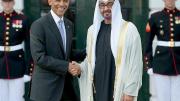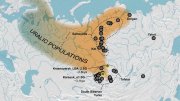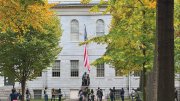Professor of government Dustin Tingley is interested in the mechanisms that make politics work, especially in the notoriously untheorizable field of international relations. In Sailing the Water’s Edge: The Domestic Politics of American Foreign Policy (Princeton University Press, $35), he and Princeton political scientist Helen V. Milner challenge the popular myth that the executive branch controls U.S. foreign-policy priorities—showing instead how domestic politics shape the character of the nation’s relationships abroad.
Facing crises in Syria and Ukraine, many critics in the United States have pushed President Obama to employ military force to “solve” these problems. His public approval ratings have fallen as the criticisms have mounted. Obama has tried to use other foreign policy instruments that he feels will be more effective. He has pushed for large trade negotiations with Asian and European allies; he has signed new defense agreements; he has worked to put into place multilateral sanctions against Russia; he has tried to use diplomacy and aid to make progress in the Israeli-Palestinian peace negotiations; and he used diplomacy to get Syria to give up its chemical weapons. As Obama himself said, “Why is it that everybody is so eager to use military force? After we’ve just gone through a decade of war at enormous cost to our troops and to our budget. And what is it exactly that these critics think would have been accomplished [by using force in Syria or Ukraine]?”
The pressures to use the military are accompanied by constraints on using other foreign policy instruments. Congress has made international trade negotiations difficult since there is not enough support to delegate trade authority to the president. The fiscal austerity imposed by Congress has made increasing foreign aid very difficult. Immigration policy has been blocked in Congress. Sanctions face interest group resistance in the United States and elsewhere in a globalized economy, but at least provide some leverage for the president internationally. When it is very difficult to get approval to employ these other foreign policy instruments and easier to use military force, it is no wonder that U.S. policy has become militarized. And this, we fear, is a major source of American foreign policy failures.…
To build and sustain a liberal, internationalist world order, the U.S. government has to be able to use not just its military and coercive instruments of statecraft. It must be able to use more cooperative instruments. It needs to be able to sign trade and investment agreements, to work with others on climate change policies, to reform the global institutions it created years ago, and to provide foreign aid to countries in need. But these types of policies are difficult to pass through the domestic political system.









